The Story Behind The The Cynar Spritz
In terms of the modern cocktail renaissance, Cynar largely dwelled in the shadow of Campari and Chartreuse, but that’s not to say that it went entirely overlooked — consider Audrey Saunders’ Little Italy or Kyle Davidson’s Art of Choke, for example. Neither drink would exist if their creators hadn’t discovered the artichoke-based amaro’s mixing potential.
But before the arrival of the early aughts school of American startenders, it mainly existed as a standalone digestif or the backbone of an herbal, bitter Cynar Spritz. While it may not be the prettiest drink in the Spritz category, its flavor profile offers a welcome departure from its sweet-leaning siblings.
According to the Cynar brand, 13 different botanicals go into its production, but the only one that isn’t a closely guarded company secret is artichokes. Relatively speaking, Cynar is a new-ish entry in the amaro category. While Campari hit the market in 1860, and both Aperol and Select debuted at the turn of the 1920s, Cynar didn’t arrive until 1952, and its steady rise in popularity has been a slow burn.
Perhaps that’s because the amaro’s flavor profile isn’t for everyone. “I think Cynar is what they give you to drink in hell,” the late bartender Sasha Petraske once told writer Robert Simonson. But as shifting tastes and collective palates continue to evolve, Cynar is becoming more ubiquitous, popping up on back bars from coast to coast. For a smooth introduction to the artichoke-based liqueur, there’s arguably no better vehicle than the Cynar Spritz. Cynar still takes center stage, but the addition of Prosecco and soda water offset its bitter, herbaceous profile. To add a bit of citrus and a touch of salinity to the mix, garnish with a lemon wheel and a green olive.



